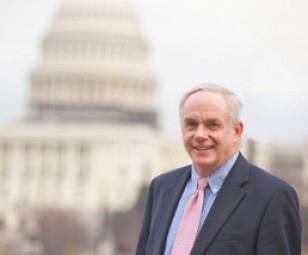Tea Party Republicans Take a Risk

In this 1996 file photo, a closed sign blocks the path to the shuttered Washington Monument during the partial government shutdown that resulted from a budget impasse between then President Bill Clinton and the GOP-controlled Congress. (AP Photo)
The U.S. government faces a partial shutdown Tuesday unless cooler heads prevail in the showdown over Republican attempts to defund President Barack Obama’s signature health care reform law. But from what we’ve seen in recent days, some of the Republicans peering over the budget abyss seem inclined to jump in and see what happens.
There is a core group of a few dozen Republicans in the House of Representatives and a handful in the Senate who seem hell-bent on pushing their opposition to what they like to call ‘Obamacare’ right up to the edge, and perhaps past, where even most Republicans are comfortable with going. From Senator Ted Cruz’s 21-hour plus simulated filibuster on the Senate floor to a succession of Tea Party rallies in front of the Capitol, what I would call the ‘no compromise conservative coalition’ has decided it’s time to draw a line in the sand over Obamacare, come hell, high water or even political consequences in next year’s congressional elections.
The Forces Behind the Clash
No doubt about it, 2008 was a significant year in the history of U.S. politics. Barack Obama’s accession as the first African American president and all that signified in terms of the country’s long racial struggles and attempts to live up to its original democratic ideals were all encapsulated in the story of the 2008 presidential election.
But consider for a moment the significance of what happened just two years later in the congressional midterm elections of 2010. Republicans made historic gains in the House and took control with major help from the Tea Party movement, which originated in part out of opposition to the president’s health care proposal but also because of years of conservative frustration with congressional Republicans cutting deals that led to higher government spending and, in some cases, higher taxes.
These frustrations fueled a movement that directly resulted in the election of Republicans, especially in the House, who were less inclined toward compromise and driven more by grass roots conservative demands that they stand for something and reject business as usual. In short, a different breed of congressional Republican, more worried about what conservative activists thought in their own home districts that the more national concerns being pushed by Republican leaders in the House and Senate.
Add to this another complication. Republicans effectively used the 2010 national census and subsequent redrawing of congressional districts around the country to not only solidify their majority in the House but to make many individual congressional districts even more conservative than they were previously. That ensured that Democrats would have little chance to compete in many of these districts. It also meant that while Republicans had little to fear from Democrats in their home districts, what they really had to watch out for was a primary challenge by someone even more conservative than they were.
Oh, and let me add in something about money too. With the loosening of campaign finance laws, thanks to the Supreme Court, and the greater of involvement of corporations and unions in campaigns and political ads, it is much easier for upstart Republicans who have support from Tea Party groups to challenge incumbent Republican lawmakers in both the House and the Senate. Groups like Heritage Action and Freedom Works, which support Tea Party efforts, can be mobilized quickly and effectively to make life miserable for an incumbent who is not deemed sufficiently conservative. The result: many Republicans are now afraid of their own conservative shadows and will do anything to avoid battling a more conservative challenger in a Republican primary. There was a time when some lawmakers would react to appeals to set aside partisanship for the good of the country. Today, many lawmakers are more concerned with protecting themselves from the wrath of the Tea Party.
A Preview of 2016

Sen. Ted Cruz, R-Texas speaks on the Senate floor during a marathon speech against Obamacare that lasted more than 21 hours. (AP Photo)
The Ted Cruz ‘speechathon’ in the Senate this week was clearly a preview of the 2016 battle for the Republican Party’s presidential nomination. Cruz is battling for an early advantage with Tea Party supporters and other conservative activists as he looks ahead to what many people believe is a likely run for president three years from now. In order to be a viable candidate, Cruz would first have to win over a large swath of the conservative wing of the party, the wing that now always plays a crucial role in the early stages of the primary campaign.
In the last two presidential election cycles, conservatives were split among several candidates and that allowed John McCain in 2008 and Mitt Romney in 2012 to emerge as the nominee, even though both men had previously positioned themselves as moderates.
Cruz is hoping to get an early start by become a conservative favorite, and what better way to demonstrate that than by holding the Senate floor for more than 21 hours in a doomed effort to undo Obamacare. But Cruz will have plenty of company competing for conservative votes in the 2016 primaries from fellow senators like Rand Paul of Kentucky and Marco Rubio of Florida, not to mention New Jersey Governor Chris Christie. But it was no coincidence that among those joining Cruz in his talkathon were none other than Paul and Rubio. Although they only made cameo appearances compared to Cruz, they are not about to cede the spotlight to Cruz when it comes to crusading against the number one target for the Tea Party and conservatives in general—Obamacare.


2 responses to “Showdown Looms Over Government Shutdown”
[…] Voice of America (blog) […]
[…] Voice of America (blog) […]